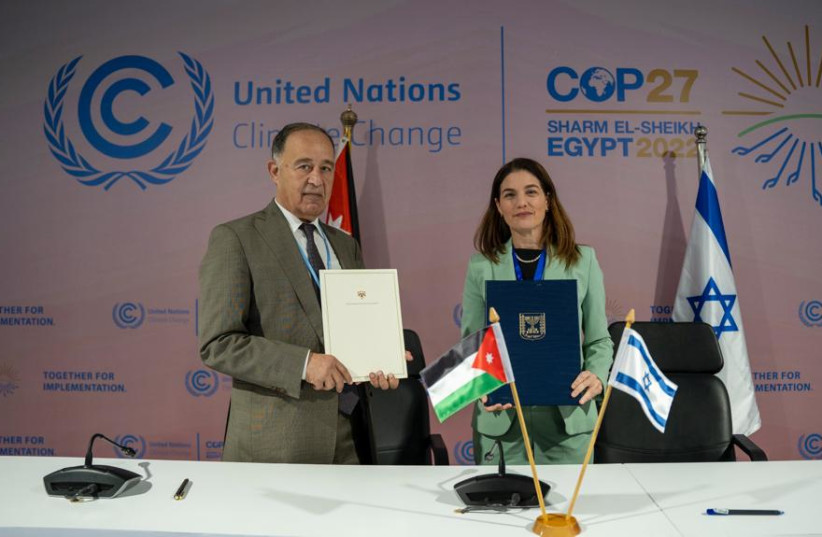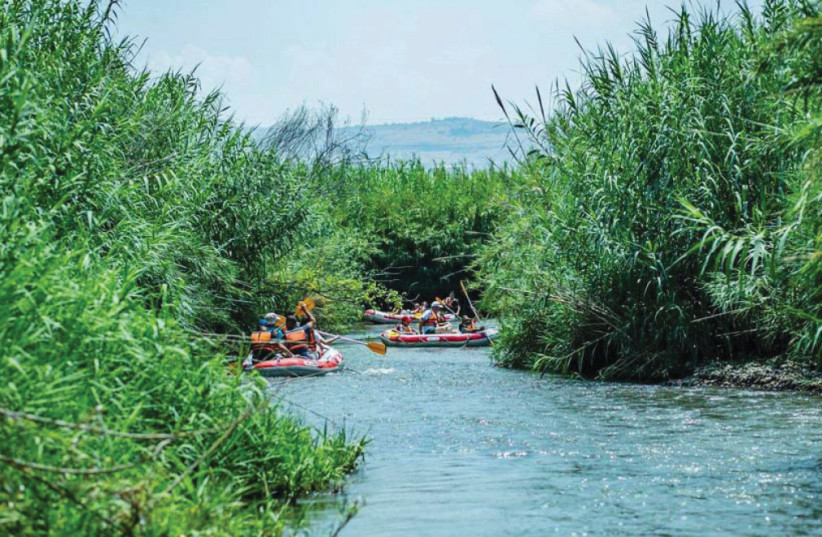The ecological restoration of the Jordan River “requires transboundary action,” Israel and Jordan agreed in a joint declaration signed in Sharm El Shiekh.
NOVEMBER 17, 2022

Israel and Jordan will cooperate on the ecological rehabilitation, restoration and sustainable development of the Jordan River, it was announced Thursday at COP27 in Sharm e-Sheikh.
A Joint Declaration of Intent was signed during the climate change conference by Environmental Protection Minister Tamar Zandberg and Jordanian Water and Irrigation Minister Mohammad Najjar. In the declaration, the two sides “recognized that restoration of the river requires trans-boundary action,” a statement read.
Israel and Jordan’s plan to restore the Jordan River
The two nations will work to remove pollution sources in their respective territory with the construction of wastewater treatment facilities. In addition, communities living along the river will be connected to advanced sewage infrastructure, as per the joint declaration.
The declaration further stated that the river’s restoration is expected to create new opportunities for cooperation between the two Middle East countries, with the goal of improving quality of life on both sides of the 251-kilometer-long river.
Kayaking on the Jordan River with Abu-Kayak (credit: Courtesy)
The Jordan River, which flows through Lake Kinneret in Israel’s North to the Dead Sea, is a natural border between Israel including the West Bank and the Hashemite Kingdom of Jordan to its east.
Due to human activity, the river has become “a dumping ground of waste, raw sewage, saline waters, and fishpond waste,” Gidon Bromberg, EcoPeace Middle East director, previously told The Jerusalem Post.
The river is “so heavily degraded it has lost 95% percent of its historical flow over the last 50 years,” he said. “An estimated 50% of the river’s biodiversity has been lost and the river is in a terrible state,” he said.
Several sections and streams of the Jordan River were declared contaminated by the Health Ministry over the past decade, including the Hasbani River, Nachal Gilabon, Majarasa, Yehudiya, Meshushim River, Tzalmon, Hachamisha bridge, Huri bridge and the Ateret Fortress.
Zandberg: River restoration deal about ‘health and prosperity’
THE JORDAN RIVER restoration deal appears to be one of Zandberg’s last actions in government, with the Meretz minister set to be replaced by Likud leader and prime minister-designate Benjamin Netanyahu’s presumptive government.
“A river free from hazards, clean and healthy, will provide health and prosperity for all the populations surrounding it and for all those who visit it,” Zandberg said following the signing of the declaration.
“Cleaning up the pollutants and hazards, restoring water flow and strengthening the natural ecosystems will help us prepare and adapt to the climate crisis.”
Elsewhere at COP27, Israel joined the US zero emissions initiative. The goal is to reset net emissions by the year 2050.
“The fight against the climate crisis requires us to act, and it is appropriate that the government set an example and commit to act to reset emissions caused by its activities,” said Zandberg.
She met with other foreign officials at the event such as US Special Presidential Envoy for Climate, John Kerry.
According to the initiative, the countries involved will develop and publish a road map until the next climate conference, COP28, which will be held in the United Arab Emirates, outlining the route to achieving “net zero” commitment. It will include unique interim goals for each individual country.
The American initiative calls on world governments to set an example and lead the economy to zero net emissions as well by 2050.
At the end of the event, representatives called on other countries to join the “Net Zero” initiative, and to share with them the knowledge and experience gained so far in reducing emissions and in the fight against the climate crisis.
https://www.jpost.com/environment-and-climate-change/article-722696
Israel and Jordan agree to team up to save Jordan River – Naharnet
by Naharnet Newsdesk

Israel and Jordan signed a declaration of intent on Thursday at the U.N. climate conference to conserve and protect their shared Jordan River — a sacred waterway nearly running dry because of climate change, pollution and other threats.
The agreement, struck at COP27 in Sharm el-Sheikh, Egypt, where world leaders are discussing how to mitigate the escalating impact from a changing climate, marks an important, albeit initial, step in cooperation.
Water cooperation was a key element of the 1994 peace treaty between the two countries but chilly relations over the past decades have complicated efforts to increase water supply to the Jordan River.
The plan announced Thursday is short on specifics. It says Israel and Jordan have promised to try to reduce river pollution by building up wastewater treatment facilities and upgrading sewer systems to prevent riverside cities from dumping raw sewage into the waters, according to a statement from the Israeli government.
The two countries also aim to promote sustainable agriculture, controlling runoff from farm fields and reducing the use of pesticides, it added, without elaborating on how.
“Cleaning up the pollutants and hazards, restoring water flow and strengthening the natural ecosystems will help us prepare and adapt to the climate crisis,” said Minister of Environmental Protection Tamar Zandberg.
Jordan’s state-run Petra news agency said the plan will hopefully increase water supplies and create job opportunities “for those living on both sides of the Jordan River, including Palestinians.”
The waterway separates Jordan to the east from the Israeli-occupied West Bank, seized by Israel in the 1967 Mideast war and sought by the Palestinians for their future independent state. The water basin is billed as the site where Jesus was baptized, drawing tourist revenue for both countries.
In recent years the once-rushing waters of the Jordan River have been reduced to a trickle as population growth and climate change take their toll.
Jordan reported on Thursday that the river’s runoff has plummeted to a mere 7% of what it once was. Because its waters feed into the Dead Sea, the saltwater lake is now disappearing — its levels dropping by three feet per year.
Source Associated Press
https://www.naharnet.com/stories/en/293819-israel-and-jordan-agree-to-team-up-to-save-jordan-river

